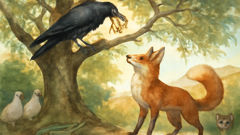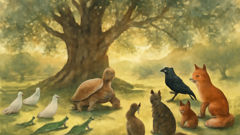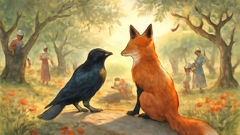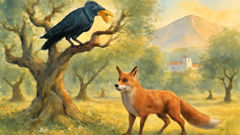Introduction
Golden sunlight spilled over the rolling hills of ancient Greece, where olive groves stretched toward a sky brushed with the faintest hints of pink and gold. The air was heavy with the scent of thyme and wildflowers, punctuated by the hum of bees and the distant laughter of children playing beside the village well. Among the twisted trunks and silver-green leaves, life unfolded in gentle rhythms. In these groves, stories were whispered as much by the wind as by the elders gathered in the shade—stories of gods and mortals, but also of the creatures who watched quietly from branch and burrow, shaping destinies in ways both subtle and profound. It was a land where cleverness was prized, beauty was admired, and the smallest incident could grow into legend. On one such morning, a crow—her feathers iridescent in the dawn—found a treasure in the village square: a wedge of cheese, golden and fragrant, likely dropped by a careless merchant. Clutching her prize, she soared to the highest branch of an ancient olive tree, eager to savor her reward away from prying eyes. Yet, she was not alone. In the cool shadow below, a fox with eyes sharp as obsidian and a mind quick as spring’s first breeze watched her every move. As the village awoke and the grove filled with life, the paths of the fox and the crow converged, setting the stage for a tale that would echo through the ages—a tale of wit and pride, cunning and consequence, where a single piece of cheese would tip the balance not only between two rivals, but across an entire community. In this sun-dappled grove, beneath the gaze of distant Mount Parnassus, the ancient fable of the Fox and the Crow began anew.
The Crow’s Triumph
In the heart of the olive grove, the morning air shimmered with anticipation. Melaina, the crow, was no ordinary bird. Her feathers gleamed blue-black in the sunlight, and her eyes sparkled with a cleverness the other crows envied. This day, however, it was not her wit that made her stand out, but the piece of cheese she had found—a rare delicacy in the animal world. She perched proudly on a twisting branch, savoring her fortune, her chest swelling with delight each time she glanced down at her prize.

The grove below was alive with morning rituals. Doves cooed from the lower branches, a lizard skittered along the warm stones, and in the underbrush, the fox named Lysandros stalked silently. Lysandros was known throughout the land for his guile. He could steal grapes from the vineyard, charm eggs from hens, and had once, it was said, tricked a shepherd’s dog out of a whole basket of figs. Today, though, his hunger was keen. The scent of cheese wafted down from Melaina’s perch, making his mouth water.
Melaina, aware of her audience, preened her feathers. She tilted her head, turning the cheese so that the golden wedge caught the light, dazzling all who looked up. The doves muttered enviously. Even the village cat, sunning itself on a nearby wall, watched with narrowed eyes.
Lysandros circled beneath the tree, tail twitching. He called up in a voice as sweet as honey, “Oh, Melaina, jewel of the sky, how your feathers shimmer in this morning sun! I have traveled many lands, but never have I seen a bird so radiant.”
Melaina paused, surprised by the fox’s sudden praise. She looked down, her pride swelling even further. It was rare for any animal—let alone cunning Lysandros—to offer such compliments. She adjusted her stance, presenting her best side.
Lysandros continued, “Surely a creature so beautiful must have a voice to match. If only I could hear you sing, I am certain even the gods would be jealous!” The other animals listened, their curiosity piqued. Would Melaina indulge him? She hesitated. On one hand, she knew the fox’s reputation. On the other, she could not resist the urge to demonstrate her talents.
With a triumphant flutter, Melaina opened her beak to sing. The cheese tumbled from her mouth, falling in a slow arc toward the waiting fox. Lysandros caught it neatly and bowed deeply, his eyes twinkling with victory.
A hush fell over the grove. Melaina stared in shock, her song stilled by the loss of her treasure. The fox flashed a sly smile and vanished into the underbrush, his prize secure. The other animals watched in silence, a lesson hanging in the air as heavy as the scent of thyme.
Echoes Through the Grove
The grove buzzed with talk after the incident. Animals whispered about Melaina’s pride and Lysandros’s cunning, their voices weaving through the branches and burrows. Some pitied Melaina, who sat sulking on her branch, her feathers ruffled and her spirit wounded. Others admired Lysandros’s wit, secretly wishing they could outsmart their rivals as he had.

Yet beneath the surface of gossip and envy, a deeper shift stirred among the villagers and creatures alike. News of the fox’s trick reached the ears of Heron the wise tortoise, who was known to spend his days meditating by the sun-warmed rocks. Heron believed every event in the grove carried a lesson, and he saw in this tale more than mere mischief.
The next afternoon, as shadows grew long and cicadas sang, Heron summoned the animals to a gathering beneath the oldest olive tree—a tree so ancient its roots seemed to touch the memories of the earth itself. Melaina, humbled but still proud, joined reluctantly. Lysandros, his belly full and his confidence brimming, arrived last, tail held high.
Heron’s voice was slow but steady as he addressed them. “We have all witnessed cleverness and vanity at play. But what has been gained? What has been lost?”
The doves cooed uncertainly. The lizard flicked his tongue, lost in thought. The village cat yawned, unconcerned. Melaina, however, found herself reflecting on Heron’s words. She realized that her desire for praise had cost her dearly—not just the cheese, but also her dignity. Lysandros listened, his eyes narrowed, wondering if perhaps his trick had sown more trouble than he intended.
Heron continued, “Wisdom lies not in outsmarting others alone, nor in seeking applause. It grows in knowing oneself—strengths and weaknesses both—and choosing actions that honor that truth.” The words hung in the air, gentle as the breeze but sharp as olive thorns.
As days passed, Melaina became more thoughtful. She listened to the wind in the trees and watched how other birds shared food and news without boasting. Lysandros, too, found his reputation shifting. Some now avoided him, wary of his tricks. Others sought his advice, hoping to learn the art of words—yet soon realized that cleverness without kindness left one lonely.
In time, the story of the fox and the crow spread beyond the grove, reaching villagers who began to use it as a lesson for their children. They spoke of pride and humility, of wit and honesty, weaving the tale into songs sung at sunset and lessons shared at the hearth. The olive grove, once just a backdrop to daily life, became a living symbol of wisdom—a place where animals and people alike remembered that every choice echoes through the world around them.
A Lesson Remembered
Seasons turned. The olive trees grew heavy with fruit, their trunks gnarled by time but sturdy as ever. Melaina and Lysandros were changed by their encounter—less rivals now, and more wary companions, each respecting the other’s strengths.

Melaina no longer preened for applause. Instead, she became known for her wisdom, warning younger crows against the dangers of vanity and careless pride. She would say, “Remember, it is not enough to be clever or beautiful; it is better to be true.” She found new ways to use her gifts—alerting others to danger, sharing discoveries, and even once helping a fledgling who’d fallen from its nest. In return, her standing among the birds grew, not from showmanship, but from quiet respect.
Lysandros, for his part, learned the limits of cunning. He realized that trickery brought short-term gain, but lasting trust was far more valuable. One evening, when a wild dog threatened the grove, it was Lysandros who sounded the alarm, risking his own safety to help others. His reputation softened; animals approached him with less suspicion, and he found that genuine friendship brought more warmth than victory alone.
The village children—who had watched Melaina’s downfall and Lysandros’s triumph from afar—grew up hearing their tale retold by elders. It became a lesson as central as any story of gods or heroes. Teachers wove it into their lessons about virtue; parents reminded children to listen more than boast, to value substance over praise. Even the village festival, once focused on contests of skill and beauty, began to include storytelling competitions where wisdom was rewarded alongside talent.
One autumn afternoon, an aged Melaina sat beside Lysandros atop a sun-warmed rock. They looked over the grove together as golden light painted long shadows across the fields. Birds flitted through the branches, and in the distance, villagers gathered for the annual harvest feast. Melaina spoke quietly, “Once, I would have given anything to be admired. Now I see that true worth comes not from what others say, but from what we choose to do.” Lysandros nodded, his eyes gentle, “And cleverness, when shared for good, becomes wisdom.”
Their friendship—born from rivalry—became a quiet legend itself. When Melaina eventually left the grove for distant lands, and Lysandros grew slow with age, the story endured. It lived on in the songs of birds, the whispers of leaves, and the laughter of children playing beneath the olive trees.
And so, under the watchful eyes of gods and mortals alike, the tale of the Fox and the Crow remained—a reminder that pride and cunning have their place, but wisdom and humility endure far longer than the fleeting taste of cheese.
Conclusion
The story of the Fox and the Crow endures not just because of a clever trick or a moment of pride, but because it reveals something universal about our nature—animal and human alike. In the olive groves of ancient Greece, where stories became the very fabric of life, this fable took root and blossomed into a lesson carried forward through generations. Its echoes can be heard in every village square where elders remind children to listen well and act wisely, and in every family that values humility over boasting. The tale reminds us that wit is powerful, but kindness and wisdom outlast even the most skillful deception. As long as olive trees sway in the Greek sun and crows circle above fields of golden grain, the story will live on—teaching each new listener that true worth is not found in fleeting applause or clever words, but in deeds that honor both self and community. Through laughter and loss, rivalry and respect, the fable endures—a timeless reminder that wisdom grows not only from triumphs and treasures, but from how we learn, change, and choose to share our gifts with those around us.













